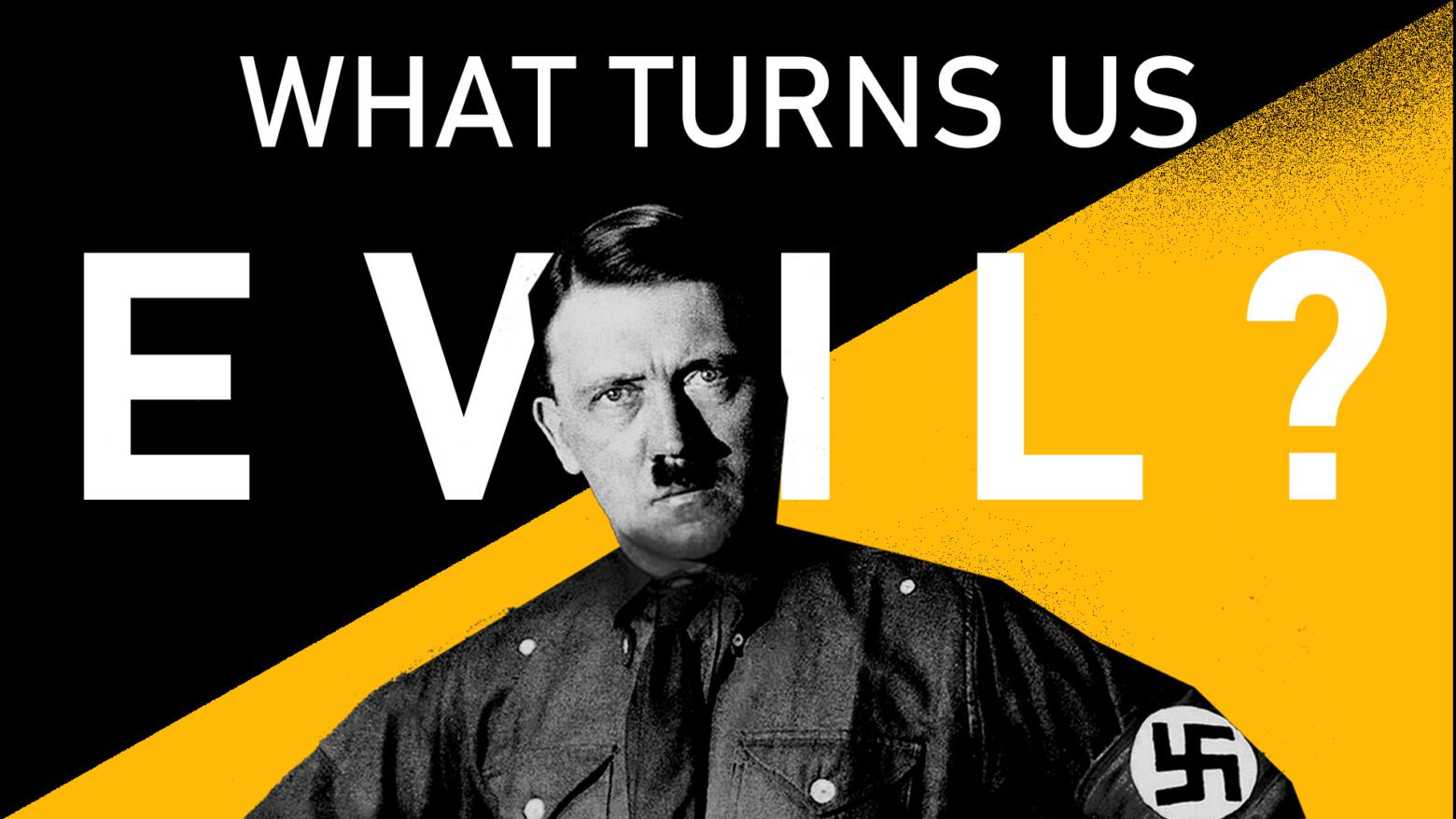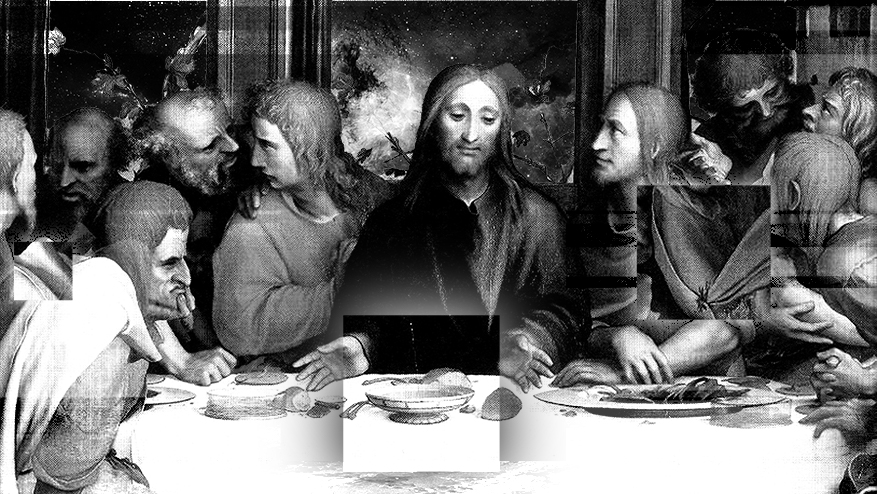Where does evil come from?
Ernest Becker’s last book, Escape From Evil, is a piercing psychological analysis of human aggression. The book provides a sweeping historical perspective beginning with man’s evolutionary origins as a single-cell organism, continuing through primitive society, organized religion, the invention of money – going all the way to the Nazi and communist ideologies of the 20th century.
With the help of post-Freudian psychology, Becker gets to the heart of how exactly evil works. He also gives us an explanation of why manmade destruction has only grown in magnitude with the rapid development of our species.
Below I’ll share with you a few passages from the book. These summarize Becker’s argument about the origin of human evil. His insights apply to our species, but also to each one of us individually. I hope this article sheds some new light for you on the dark corners of your own psyche. (Don’t worry, we all have them.)
(You can watch the video version of this essay on YouTube.)
Ernest Becker on the Denial of Death
Becker begins with the simple fact that all creatures desire life and evade death. He writes:
All organisms want to perpetuate themselves, continue to experience and to live. It is a great mystery that we don’t understand but observe every day: we are amazed, as we try to club a cornered rat, how frantically he wants to live. All animals are this frantic, without even knowing what death means; they probably only sense the danger of crushing opposing power …
For all organisms, then, opposing and obliterating power is evil – it threatens to stop experience.
But men are truly sorry creatures because they have made death conscious. They can see evil in anything that wounds them, causes ill health, or even deprives them of pleasure. Consciousness means too that they have to be preoccupied with evil even in the absence of any immediate danger …
The result is one of the great tragedies of human existence, what we might call the need to “fetishize evil,” to locate the threat to life in some special places where it can be placated and controlled. It is tragic precisely because it is sometimes very arbitrary: men make fantasies about evil, see it in the wrong places, and destroy themselves and others by uselessly thrashing about …
Ernest Becker, Escape from Evil
Becker explains that since man is conscious of death, this makes him the most vulnerable of all animals. Most vulnerable not because of any physical disadvantage, but because man alone of all species understands his vulnerability.
Our self-awareness makes every corner of the universe a potential death trap. We know our life can end at any moment. This existential dread would have crushed us had we not developed, through millennia of psychological evolution, ways to reduce the cosmic evil we perceive into smaller, more manageable forms.
Managing Evil
This is the origin of scapegoating, choosing one arbitrary object as the embodiment of all evil. When we pick out a scapegoat and then ritually destroy it, we feel like we are destroying evil itself. For a time – our existential dread subsides.
We observe this in primitive rituals, as Becker writes:
In one of its forms scapegoating is also magical in origin: a ritual is performed over a goat, by which all the tribe’s uncleanliness (sin) is transferred to the animal; it is then driven off or killed, leaving the village clean.
Ernest Becker, Escape from Evil
Scapegoating might seem like an oddity of our religious history. However, it is much more relevant to each one of us today than it might seem. In fact, it is a universal reflex of the human mind.
The great psychologist Carl Jung called it ‘shadow projection’. By this, he meant the act of refusing to face the darker elements within ourselves and unconsciously projecting them onto other people. Becker writes:
As Jung put it, the shadow becomes a dark thing in one’s own psyche, “an inferiority which none the less really exists even though only dimly suspected.” The person wants to get away from this inferiority, naturally; he wants to “jump over his own shadow.” The most direct way of doing this is by “looking for everything dark, inferior, and culpable in others.”
Ernest Becker, Escape from Evil
Shadow Projection
We can see how shadow projection is just like primitive scapegoating, only brought to the personal, psychological level.
It goes like this:
I am a dishonest man, but I do not want to face this fact. Therefore, I go around calling everyone a liar, a cheat, a fraud. I cannot deal with my own dishonest nature and this frightens me. Therefore, I project it outside and defeat its imaginary projection with my indignation. This makes me feel I have overcome that within me which I am actually too frightened to face.
Had this process been strictly personal, the damage it created in the world would probably have been negligible. However, Becker points out that shadow projection scales up as people gather together. Then it becomes a social, national, even a cultural phenomenon.
The Collective Shadow
While once sacrificing a goat to the gods was enough to protect a people from existential dread, today’s massive groupings of people require far greater sacrifices. The Nazi holocaust is one horrifying example of what happens when a whole nation projects its shadow on an ethnic minority.
Becker points out all political scapegoating is essentially a religious ritual. It is the act of embodying all the evil in the world and all the injustice in the state onto one easily discernible object. An object that then must be destroyed to destroy the evil it symbolizes. We read:
[With the coming of the state] began mankind’s real woes. The new class society of conquerors and slaves right away had its own internal frictions; what better way to siphon them off than by directing the energies of the masses outward toward an “alien” enemy?
The state had its own built-in wisdom; it “solved” its ponderous internal problems of social justice by making justice a matter of triumph over an external enemy. This was the start of the large-scale scapegoating that has consumed such mountains of lives down through history and continues to do so today, right up to Vietnam and Bangladesh . . . popular hatred for the ruling classes was cleverly diverted into a happy occasion to mutilate or kill foreign enemies.
In short, the oppressor and the oppressed, instead of fighting it out within the [ancient] city, directed their aggression toward a common goal – an attack on a rival city. Thus the greater the tensions and the harsher the daily repressions of civilization, the more useful war became as a safety valve.
Ernest Becker, Escape from Evil
But to say war and scapegoating are a safety valve for the internal conflicts of the state only goes so far. The root of evil, Becker reminds us, is in the tragedy of the human condition. The tragedy that humans alone of all animals know we are animals – we know we are going to die. And, as Becker pointed out, it is our instinct, it is in our source code to want to evade death. To evade the animal within us.
It is our inner animal that is our deepest shadow. And, like Jung explained, we go around projecting our shadow in small and big ways. The small ways can be really small, but the big ways… they can be really big.
Genocide big.
Every time we point the finger at a nation, a people, a community… Every time we say ‘It’s them! They are the problem!’ we are effectively scapegoating. We are projecting our shadow. We are turning others into the animals we are too frightened to admit we are.
The terrifying conclusion of Becker’s last book is this – human evil really is HUMAN evil.
This leaves us with much food for thought. Not least of all, it reminds us that every time we point the finger at someone, we are effectively under the same spell that has motivated the greatest crimes against humanity. We are throwing all the incomprehensible danger of the world and all the inferiority we feel in ourselves onto another. A scapegoat.
This is where evil comes from.
These were Becker’s ideas, but what are yours? Do you agree with this interpretation of evil? Let me know in the comments!
Also, if you’d like a deeper dive into Becker’s ideas, make sure to check our two previous articles/videos. There we go in-depth into Becker’s interpretation of both gift-giving and the economy as forms of religious ritual.



I agree with this article!! I appreciate how it makes me want to take more responsibility and accept and face the parts of my shadow I’ve been scared to face. Actually maybe not face so much as accept. Hard to accept something in my past. This article and the one on Buddism vs Jung has confirmed and explained some thoughts I have had. It makes sense how the unconscious mind still has the experiences that bring the past up under the right conditions. Before I read both articles my thoughts were, I recognize my conscious triggers that are obvious. Lately I started noticing them in a deeper sense thinking that I was being triggered from the unconscious mind. Example would be unconsciously watering the unwholesome seeds in the unconscious mind. Thanks for the article!!
Thank you, my friend, I’m glad the articles have been of some use to you!